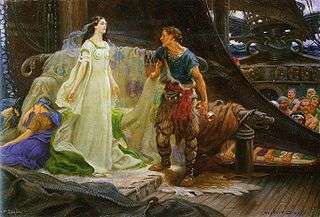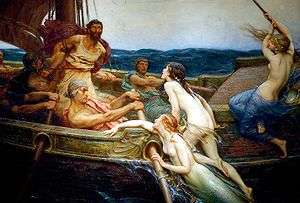Herbert James Draper
| Herbert James Draper | |
|---|---|
 Herbert James Draper | |
| Born |
Herbert James Draper November 1863 (or 1864) London, England |
| Died |
22 September 1920 London, England |
| Nationality | English |
| Education | St John's Wood Art School |
| Known for | Painting |
| Notable work | The Lament for Icarus, 1898 |
| Movement | Classicism |
| Awards |
Gold Medal, 1890 Travelling Scholarship, 1890 |
Herbert James Draper (November 1863 (or 1864)[1]– 22 September 1920) was an English Classicist painter whose career began in the Victorian era and extended through the first two decades of the 20th century.
Life
Born in London, the son of a jeweller named Henry Draper and his wife Emma,[2] he was educated at Bruce Castle School in Tottenham[3] and then went on to study art at the Royal Academy.[3] He undertook several educational trips to Rome and Paris between 1888 and 1892, having won the Royal Academy Gold Medal and Travelling Studentship in 1889. In the 1890s, he worked as an illustrator, eventually settling in London. In 1891, he married Ida (née Williams), with whom he had a daughter, Yvonne.[3] He died of arteriosclerosis at the age of 56, in his home on Abbey Road.
Career
Draper's most productive period began in 1894. He focused mainly on mythological themes from ancient Greece. His painting The Lament for Icarus (1898) won the gold medal at the Exposition Universelle in Paris in 1900 and was later bought for the Tate Gallery by the Chantrey Trustees. He was also responsible for the decoration of the ceiling of the Drapers' Hall in the City of London.[3][4] Though Draper was neither a member nor an associate of the Royal Academy, he took part in the annual expositions from 1890 on.[3] In later years as the public tastes changed and mythological scenes became less popular he concentrated more on portraits.[3][5]
During his lifetime Draper was quite famous, a well-known portrait painter. In his last years, his popularity faded, though there has recently been a revival of interest in his work on the art market.[6] The sale of his painting The Sea Maiden by the Royal Cornwall Museum in 2010, to help secure its finances, generated debate about the policy of disposing of art works for this purpose.[7]
Gallery
 The Vintage Morn
The Vintage Morn A Young Girl by a Pool
A Young Girl by a Pool Calypso's Isle
Calypso's Isle The Kelpie, 1903
The Kelpie, 1903 Tristan and Isolde
Tristan and Isolde The Water Nymph, 1908
The Water Nymph, 1908 Ida Draper
Ida Draper Ariadne
Ariadne A Nymph in a Sunlit Glade
A Nymph in a Sunlit Glade By Summer Seas
By Summer Seas The Pearls of Aphrodite
The Pearls of Aphrodite The Lamia, 1909
The Lamia, 1909 Bather
Bather Art and the Jade
Art and the Jade Portrait Of Miss Barbara De Selincourt
Portrait Of Miss Barbara De Selincourt Clyties of the Mist
Clyties of the Mist The Lament for Icarus, 1898
The Lament for Icarus, 1898 A Water Baby
A Water Baby Prospero
Prospero Gates of Dawn
Gates of Dawn In the Studio
In the Studio The Capture
The Capture Sea Melodies
Sea Melodies
Notes
- ↑ "Herbert Draper". Tate. 1920-09-22. Retrieved 2015-06-07.
- ↑ 1871 British census entry for 32 New Bond Street, Westminster
- 1 2 3 4 5 6 The Times, Thursday, Sep 23, 1920; pg. 1; Issue 42523; col A
- ↑ Prospero summoning Nymphs and Deities
- ↑ At a charity auction for the Red Cross in 1918 his offer to paint a child's portrait brought in a bid of £250:The Times Monday, Jul 15, 1918; pg. 4; Issue 41842; col A
- ↑ His painting The Sea Maiden was sold for £937,250 ($1,384,318) in Sale 7856 at Christie's in London, 16 June 2010
- ↑ The Independent, 26 July 2010: Jenkins, Tiffany, 'Don't put a price on our national treasures' Independent.co.uk
Further reading
- Toll, Simon: Herbert Draper 1863–1920: A Life Study (Antique Collector's Club; 2003). ISBN 1-85149-378-6
External links
| Wikimedia Commons has media related to Herbert James Draper. |
- H J Draper (Victorian Web)
- H J Draper online (ArtCyclopedia)
- Works by H J Draper (Tate Gallery)
- H J Draper (Art Renewal Center)
- Works by Herbert James Draper at Project Gutenberg
- Works by or about Herbert James Draper at Internet Archive